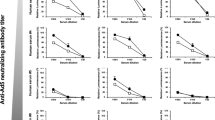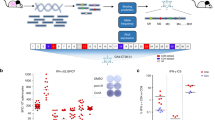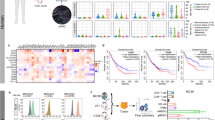Abstract
Adenovirus (Ad) vectors are being intensively studied as vehicles for cancer gene therapy. We have been exploring the benefits of direct intratumoral injection of Ads expressing cytokines for immunotherapy. Our previous work demonstrated that therapy using a vector expressing interleukin-12 (AdmIL-12.1) produced regressions in approxi- mately 80% of treated tumors, supporting further preclinical investigations. Recent reports have shown that immunity to Ad can be a major limiting factor in Ad-mediated gene transfer. As most animal studies with Ad vectors have involved nonimmune hosts, it remains difficult to predict how effective these treatments will be in humans, where the majority of individuals have had previous exposure to Ad. To address this question, we compared the effectiveness of the AdmIL-12.1 cancer therapy in naive and Ad-immune mice. We found that both groups responded equally well to treatment and that the response to AdmIL-12.1 in both groups resulted in the generation of CTL reactive against tumor antigen, indicating that antitumor immunity was achieved. Peak transgene expression in the tumor was only reduced by 2.4-fold in Ad-immune animals compared with nonimmune mice. It was also observed that in naive animals, the virus disseminated from the site of the tumor following injection and by 72 h substantial transgene expression was detected in peripheral organs, most notably the liver. Transgene expression in the liver of Ad-immune animals was reduced by greater than 1000-fold relative to that in naive mice. These results strongly support the clinical utility of Ad-based cancer gene therapy and suggest that Ad immunity may be advantageous in that it is not a complete block to gene transfer in the tumor and it greatly reduces virus dissemination.
This is a preview of subscription content, access via your institution
Access options
Subscribe to this journal
Receive 12 print issues and online access
$259.00 per year
only $21.58 per issue
Buy this article
- Purchase on Springer Link
- Instant access to full article PDF
Prices may be subject to local taxes which are calculated during checkout
Similar content being viewed by others
Author information
Authors and Affiliations
Rights and permissions
About this article
Cite this article
Bramson, J., Hitt, M., Gauldie, J. et al. Pre-existing immunity to adenovirus does not prevent tumor regression following intratumoral administration of a vector expressing IL-12 but inhibits virus dissemination. Gene Ther 4, 1069–1076 (1997). https://doi.org/10.1038/sj.gt.3300508
Received:
Accepted:
Issue Date:
DOI: https://doi.org/10.1038/sj.gt.3300508
Keywords
This article is cited by
-
Breast cancer gene therapy using an adenovirus encoding human IL-2 under control of mammaglobin promoter/enhancer sequences
Cancer Gene Therapy (2016)
-
Expression of the fusogenic p14 FAST protein from a replication-defective adenovirus vector does not provide a therapeutic benefit in an immunocompetent mouse model of cancer
Cancer Gene Therapy (2016)
-
Intratumoral delivery of CD154 homolog (Ad-ISF35) induces tumor regression: analysis of vector biodistribution, persistence and gene expression
Cancer Gene Therapy (2012)
-
Pre-existing Immunity and Passive Immunity to Adenovirus 5 Prevents Toxicity Caused by an Oncolytic Adenovirus Vector in the Syrian Hamster Model
Molecular Therapy (2009)
-
Characterization of the adaptive and innate immune response to intravenous oncolytic reovirus (Dearing type 3) during a phase I clinical trial
Gene Therapy (2008)



